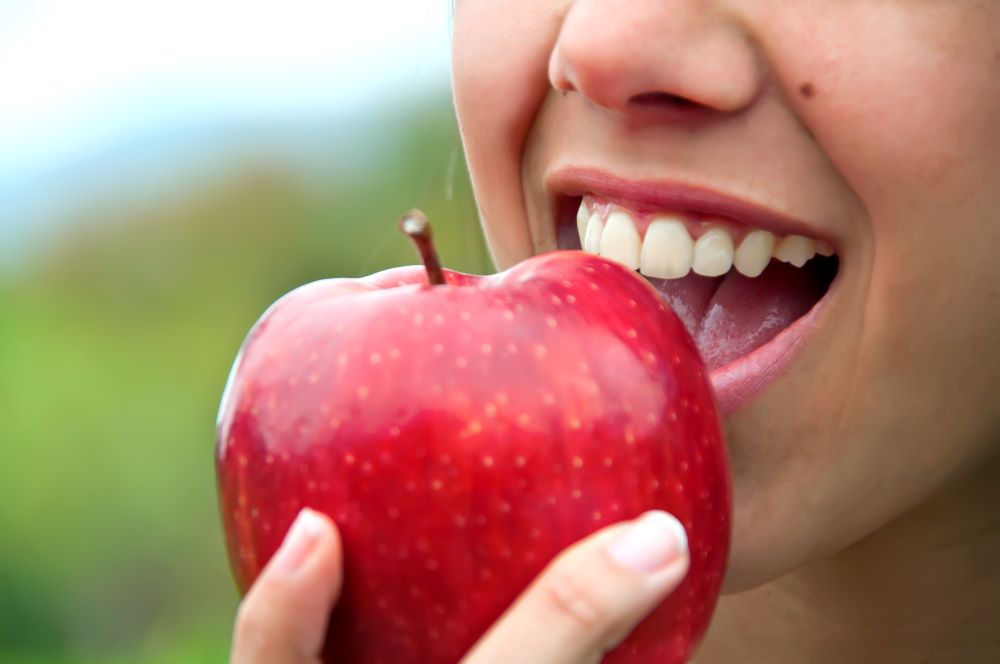What you eat affects your whole body, including your teeth. That’s why dentists will steer you away from some foods, especially sweets, and encourage you to eat others, like fibrous vegetables.
Protein and vitamin deficiencies can harm children’s dental health because they can delay tooth eruption and jaw development. However, these deficiencies can affect your dental health, regardless of age.
So what foods does your dentist want you to eat more of to prevent deficiencies and maintain tooth health, and what should you avoid?
Dentists Recommend Fruits and Vegetables
Fruits rich in vitamin C and other antioxidants help neutralize the bacteria that cause plaque to grow on your teeth, leading to cavities. Some of the best options include:
- Strawberries
- Cranberries
- Oranges
- Grapefruit
- Apples
- Kiwi
Stick to fresh fruit and not their dried counterparts, which contain a lot of added sugars and preservatives. Also, remember that very acidic fruits can cause enamel erosion if you eat them on their own, so chop them up and eat them with other fruits or cook them.
Vegetables that are crunchy and high in fiber are excellent for stimulating salivation. Your saliva plays a big role in protecting your teeth from bacteria by reducing certain acids, which is why people with dry mouths struggle more with oral health.
Fibrous vegetables also stimulate your gums, helping to fight off bacteria. Some options to try are:
- Celery
- Carrots
- Collard greens
Carrots, in particular, are beneficial because they are a source of beta carotene, which your body needs to form vitamin A. Vitamin A is a key component in the formation of keratin, which tooth enamel contains.
Leafy greens are also important for tooth health. Options like kale, chard, and cabbage are packed with calcium, magnesium, and many other minerals and vitamins your teeth need.
Protein for Tooth Health
Animal protein contains phosphorus, a mineral crucial for strengthening your jaw and teeth. Protein also has fatty acids, calcium, and vitamins C and D, all important for maintaining healthy teeth and protecting enamel.
The protein-rich foods that dentists recommend are:
- Eggs
- Dairy
- Meat
- Lentils
- Beans
- Tofu
- Seeds
- Nuts
Protein helps maintain bone mineral density (BMD), which affects not only your jaw and dental structures but your whole body.
Green and Black Teas
Green and black teas contain polyphenols, which fight off plaque-forming bacteria, preventing them from creating the acids that eat away at your enamel. Polyphenols have the potential to also prevent gum inflammation.
If you’re someone who experiences bleeding gums when you floss or brush your teeth, adding a cup of tea to your daily routine can help prevent inflammation. Make sure not to add sugar, however.
Green and black teas have antioxidants that impact your saliva’s pH, helping neutralize acid levels.
To strengthen the benefits of a cup of green or black tea on oral health, brew it with fluoridated water.
Dairy for Stronger Teeth
Dairy, especially milk, contains phosphorus, casein, and calcium, which keep your teeth strong and have decay-fighting properties. They also form a protective film over teeth, helping to prevent damage from corrosive acids.
Yogurt is another excellent option, as long as it has a low sugar content. Yogurt contains casein, calcium, and phosphorus as well.
Foods to Avoid
Your dentist has probably told you to consume sugary foods and drinks in moderation, but why? Sugar feeds the bacteria in your mouth, allowing it to grow and spread. The bacteria begin forming acids that eat away at your tooth enamel, which makes it easier for cavities to form.
Not only does sugar impact your teeth, but it can also lead to gum disease. The same bacteria that harm your tooth enamel can impact gum tissue, leading to pain, bleeding gums, and even tooth loss.
Starchy foods that tend to get stuck in your teeth are also things dentists recommend you avoid. These include potato chips and soft breads. The starch content creates a perfect breeding ground for bacteria.
Carbonated drinks should be avoided as well. They are packed with sugar and contain high levels of citric and phosphoric acids that wear down your enamel.
Maintaining Your Dental Health
Knowing what foods to stick to and which ones to avoid allows you to give your teeth the nutrients they need to remain healthy. Brush your teeth at least twice daily, floss once daily, and visit your dentist regularly for checkups and cleanings.
By turning to Dr. Brett Langston at Dental Implant & Aesthetic Specialists, you can get the careful monitoring your teeth deserve. Contact Dr. Brett Langston today.

